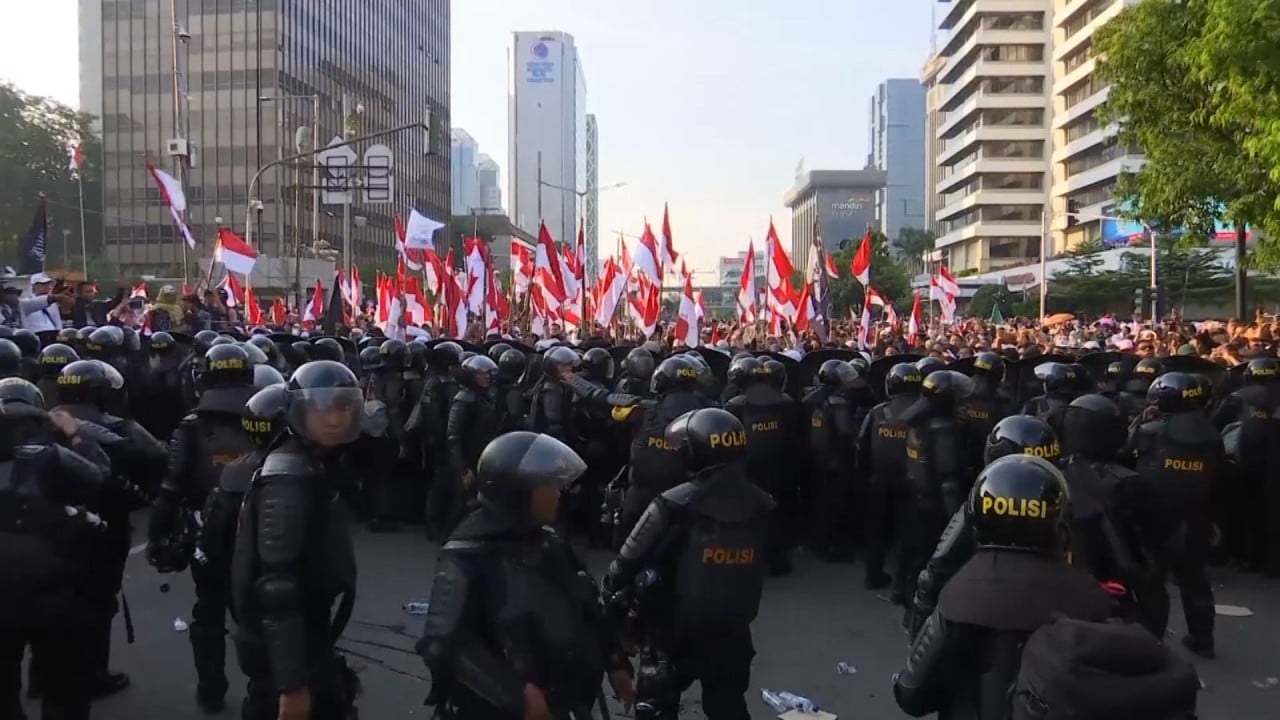But how did Prabowo, after two failed presidential bids, make his way to the top of opinion polls?
Experts suggest the former military general has worked to rebrand himself, , shifting away from his former strongman persona by taking a softer tact in his speeches and using an impressive social media campaign to connect with younger voters.
Prabowo lost to Widodo in both 2014 and 2019’s presidential elections. After the latter poll, he accused the government of electoral fraud, despite falling short by around 17 million votes, prompting deadly riots in the streets of Jakarta. The two politicians eventually reconciled, with Prabowo being co-opted into Widodo’s cabinet through his appointment as defence minister.
Accusations that used to trail the minister of a concerning human rights record have largely been forgotten by the media and the public, experts say, replaced with an image of an even-tempered and easy-going politician, sharing viral selfies wearing a hoodie sporting his Gerindra Party branding.
“You have to admit, Prabowo’s style of communication is completely different from what it was like in the last election in 2019,” said Yoes Kenawas, a political researcher from Lingkaran Survei Indonesia.
“He has been working to present himself as a team player as part of Jokowi’s administration,” Yoes said. “He’s portraying himself as Jokowi’s man.”
This perceived closeness to Widodo – popularly known as Jokowi – might be the key for Prabowo, analysts said. Even as he exits leadership, Widodo has managed to keep his approval rating at an all-time high, and he is widely considered the kingmaker of the coming election.
But with the vote still seven months away, Prabowo faces a long road ahead if he wants to translate his recent momentum into a win.
Indonesian Defence Minister Prabowo Subianto hopes to get third-time lucky in his bid for the top job. Photo: AP
Stamp of approval
Widodo, himself a member of the ruling PDI-P party, had a hand in selecting Ganjar as the party’s presidential candidate. But he has not shied away from also expressing his support for Prabowo.
Back in November, Widodo even quipped that 2024 “belongs to Prabowo”.
The pair have met at least three times in the past month. “The president asked about my future plans,” Prabowo said after a meeting at the presidential palace in June.
There have also been some more indirect indications to suggest that Prabowo has Widodo’s backing.
“Many of the volunteer groups that supported Jokowi and were pivotal in his electoral victories have already endorsed Prabowo,” said Alexander R. Arifianto, a senior fellow with the S. Rajaratnam School of International Studies’ Indonesia programme.
One such group is led by Gibran Rakabuming Raka, Widodo’s elder son and the current mayor of Solo. Gibran and Prabowo’s growing closeness has sparked unease among some in the PDI-P’s higher echelons, leaving Gibran to insist his meetings with Prabowo should not be equated with an endorsement.
Ultimately, it was in Widodo’s best interests to make sure the next leader of Indonesia would secure his legacy, said Wasisto Raharjo Jati, a political analyst with the Jakarta-based National Research and Innovation Agency.
“Jokowi wants to ensure that his successor will continue his work and policies after he retires in 2024,” Wasisto said.
Jokowi wants to ensure that his successor will continue his work and policies after he retires in 2024
Prabowo has repeatedly stated that he would carry forward Widodo’s programmes as president if he is elected in February, including continuing the construction of a new US$32 billion capital Nusantara in Borneo, and the revamping of the domestic mining industry.
As a high-ranking PDI-P member, Ganjar is very likely to also continue these programmes.
However, analysts say that Ganjar’s support from the public – and likely from Widodo too – might be dwindling due to his ties to party chairwoman and former president Megawati Soekarnoputri.
Independence under question
Despite leading surveys for most of the year, Ganjar’s polling dipped after he was engulfed in an antisemitism row for opposing Israel’s participation in the Fifa Under-20 World Cup that had been set to be held in Bali. The May tournament was later moved.
Observers say Ganjar was following the PDI-P’s line on the issue. But the controversy resulted in Indonesia being stripped of its hosting rights by Fifa, which did not sit well with ordinary Indonesians, particularly younger voters in the football-crazy country.
Over the past few months, rumours have also surfaced that Megawati would have the exclusive right to pick Ganjar’s cabinet appointments, prompting concerns from non-PDI-P members of Jokowi’s coalition that they would no longer have a seat at the table.
Ganjar brushed off the rumours, but soon afterwards, leaders from coalition members Golkar and the National Mandate Party were spotted meeting with Prabowo.
“It’s going to be a challenge for Ganjar, who so far has not shown that he has an independent personality apart from being a candidate of the PDI-P and of Megawati,” Arifianto said.
“Prabowo is going to show that he is an independent persona, and that he would make a strong and decisive leader in his own right.”
With candidate registration in October fast approaching, Prabowo has yet to choose a running mate. Observers say who he picks could prove crucial. In his last campaign, he ran with businessman turned politician Sandiaga Uno. This time around, incumbent state-owned enterprises minister and business tycoon Erick Thohir has been polling as a top choice.
But Prabowo might go down a different path, analysts say, and choose a candidate who has strong links to an Islamic organisation like Nahdlatul Ulama to win support from its large voting bloc.
Anies, the ex-governor of Jakarta who has close ties with the conservative Muslim parties, has been trailing in the polls and Prabowo might be looking to absorb their votes and rally supporters to his side.
“The smart move would be to appeal to the Islamic constituency, and his vice-presidential pick can help him secure that,” Arifianto said.


